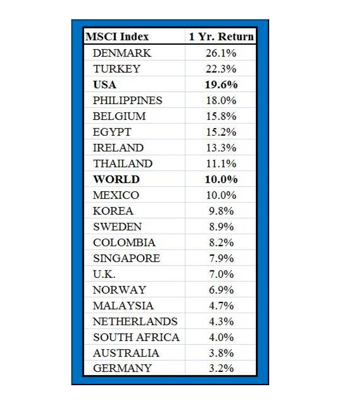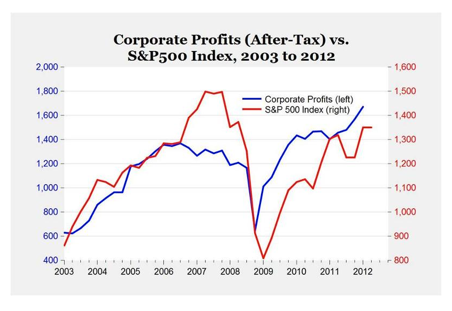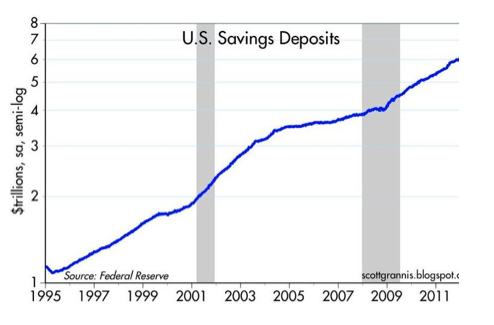The ominous economic storm clouds have been looming for quite some time now. And with the lingering European financial crisis, U.S. Presidential elections and a pending “fiscal cliff” all coming to a head in the next few months, investors have their umbrellas firmly in hand.
While average investors have been running for shelter, the stock market has been shining. In addition to the 2% gain in August, stocks have advanced about 12% in 2012 or about 20% from a year ago, as measured by the S&P 500 index. The move in the Nasdaq Composite index has been even brighter, surging 18% higher this year and about 25% from a year ago (quite a bit different from Bill Gross’s “Cult of Equity” 4% return expectations).
Here is a look at one-year returns provided by Mark Perry at Carpe Diem a week and a half ago:
A big driver for these positive returns is record corporate profits:
Plenty Of Pent-Up Demand
Despite the positive returns and record profits, investors remain terrified. How scared are people about potential economic thunder and lightning? According to Scott Grannis at Calafia Beach Pundit, savings deposits have increased by a staggering $2.4 trillion over the past four years, which effectively loses 2-3% in annual value thanks to inflation. I don’t know when negative sentiment will turn positive, but when it does, there is a lot of pent-up demand for consumption and investment.
Death To Uncertainty
The markets hate uncertainty. That cliché is often referenced, but the truth is, there's always uncertainty. More aptly stated, the markets hate additional uncertainty. So whether you are a Republican or Democrat, the mere fact the elections will be over in November may be enough to lower uncertainty and lift some of the gloomy financial clouds. Republicans hope for fiscal sanity to return with a win by the Romney ticket. But the market may favor an Obama victory because it likes the devil it knows rather than the one it doesn’t. The race, now, is tight, and as always, the Independents will determine which party ultimately wins.
When discussion shifts to the impending “fiscal cliff” (automatic tax hikes and spending cuts), voter patience wears thinner -- inaction is no longer a sustainable political strategy. If you don’t believe me, just look at the historically low Congressional approval ratings. Incumbents hoping for re-election will have to set forth credible solutions to these serious fiscal problems or suffer the consequences. Voters are serious now, and a “do-nothing” strategy will only lead to an early retirement, not a cushy paycheck in Washington, D.C.
The corporate world is watching closely, too. Tight-fisted executives sitting on trillions of dollars in cash are looking for some direction. No matter who wins, by knowing the direction of future policy changes, executive optimism is likely to spur incremental growth.
Be Prepared
Admittedly, recent economic data hasn’t been overly rosy, and there are no immediate signs of a bright and shiny economic day. Although not surprising, given the constant media attention, European economic activity has fallen into recession. In our backyard, U.S. GDP growth decelerated in the second quarter to 1.5% from 2% the previous quarter. Meanwhile, job growth has stalled. In Asia, economic figures out of China continue to generate lackluster trends. As strategist Ed Yardeni points out, “August manufacturing activity fell to a nine-month low with the new export orders index the lowest in three years.”
On the surface, the uninspiring economic data would suggest to investors that they pack their bags and move into a bunker. However, what shrewd investors realize is that trading with economic trends is not an optimal strategy. Following such logic would have led investors to pile in buying at the peak of 2007 and panic sell at the bottom in early 2009. Much of the recent economic news is nothing to write home about, most of which has already been priced in. The real trick is determining the state of affairs 12-18 months out, no easy task. So while current data is fragile at best, governments and central banks across the globe have been aggressively cutting rates, implementing fiscal stimulus and positioning for further monetary policy support. What’s more, consumers and corporations have deleveraged (cut debt) significantly and governments are currently going through that same painful process.
Sell In May And Regret Away
As the weakening data began to roll out this past spring, so-called market pundits were quick to point out the seasonal saying, “Sell in May and go away.” Well, if you followed that strategy, you may have slept better, but you not only would have incurred significant transaction costs and taxes, but would have also taken a hit from capital gains and dividends. September and October have traditionally been volatile months, so the financial market gods may still have something to say.
Weather forecasting and financial forecasting are difficult professions. Even though the economic weather has been cloudy, if you are relying too heavily on your umbrella and galoshes, the next few months should help determine whether it’s time to bust out your sunglasses and sunscreen rather than a heavy raincoat.
Wade W. Slome, CFA, CFP®
DISCLOSURE: Sidoxia Capital Management (SCM) and some of its clients hold positions in certain exchange traded funds (ETFs), but at the time of publishing SCM had no direct position in Barclays or any other security referenced in this article. No information accessed through the Investing Caffeine (IC) website constitutes investment, financial, legal, tax or other advice nor is to be relied on in making an investment or other decision. Please read disclosure language on IC Contact page.
- English (UK)
- English (India)
- English (Canada)
- English (Australia)
- English (South Africa)
- English (Philippines)
- English (Nigeria)
- Deutsch
- Español (España)
- Español (México)
- Français
- Italiano
- Nederlands
- Português (Portugal)
- Polski
- Português (Brasil)
- Русский
- Türkçe
- العربية
- Ελληνικά
- Svenska
- Suomi
- עברית
- 日本語
- 한국어
- 简体中文
- 繁體中文
- Bahasa Indonesia
- Bahasa Melayu
- ไทย
- Tiếng Việt
- हिंदी
Is It Gonna Be A Bright, Sunshiny Day?
Published 09/04/2012, 03:56 PM
Updated 07/09/2023, 06:31 AM
Is It Gonna Be A Bright, Sunshiny Day?
Latest comments
Loading next article…
Install Our App
Risk Disclosure: Trading in financial instruments and/or cryptocurrencies involves high risks including the risk of losing some, or all, of your investment amount, and may not be suitable for all investors. Prices of cryptocurrencies are extremely volatile and may be affected by external factors such as financial, regulatory or political events. Trading on margin increases the financial risks.
Before deciding to trade in financial instrument or cryptocurrencies you should be fully informed of the risks and costs associated with trading the financial markets, carefully consider your investment objectives, level of experience, and risk appetite, and seek professional advice where needed.
Fusion Media would like to remind you that the data contained in this website is not necessarily real-time nor accurate. The data and prices on the website are not necessarily provided by any market or exchange, but may be provided by market makers, and so prices may not be accurate and may differ from the actual price at any given market, meaning prices are indicative and not appropriate for trading purposes. Fusion Media and any provider of the data contained in this website will not accept liability for any loss or damage as a result of your trading, or your reliance on the information contained within this website.
It is prohibited to use, store, reproduce, display, modify, transmit or distribute the data contained in this website without the explicit prior written permission of Fusion Media and/or the data provider. All intellectual property rights are reserved by the providers and/or the exchange providing the data contained in this website.
Fusion Media may be compensated by the advertisers that appear on the website, based on your interaction with the advertisements or advertisers.
Before deciding to trade in financial instrument or cryptocurrencies you should be fully informed of the risks and costs associated with trading the financial markets, carefully consider your investment objectives, level of experience, and risk appetite, and seek professional advice where needed.
Fusion Media would like to remind you that the data contained in this website is not necessarily real-time nor accurate. The data and prices on the website are not necessarily provided by any market or exchange, but may be provided by market makers, and so prices may not be accurate and may differ from the actual price at any given market, meaning prices are indicative and not appropriate for trading purposes. Fusion Media and any provider of the data contained in this website will not accept liability for any loss or damage as a result of your trading, or your reliance on the information contained within this website.
It is prohibited to use, store, reproduce, display, modify, transmit or distribute the data contained in this website without the explicit prior written permission of Fusion Media and/or the data provider. All intellectual property rights are reserved by the providers and/or the exchange providing the data contained in this website.
Fusion Media may be compensated by the advertisers that appear on the website, based on your interaction with the advertisements or advertisers.
© 2007-2024 - Fusion Media Limited. All Rights Reserved.
